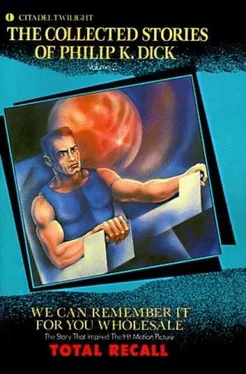True, his space-drive by modern standards had been primitive, a curiosity. But the concept remained unaltered; Williamson the pioneer, and inventor. The man who built.
Yet the city was nothing more than a village, with a few dozen houses, and some public buildings and industrial units at its perimeter. Beyond the city stretched green fields, hills, and broad prairies. Surface vehicles crawled leisurely along the narrow streets and most of the citizens walked on foot. An incredible anachronism it seemed, dragged up from the past.
"I'm accustomed to the uniform Galactic culture," Rogers said. "Relay keeps the technocratic and ideological level constant throughout. It's hard to adjust to such a radically different social stage. But you've been cut off."
"Cut off?" asked Williamson.
"From Relay. You've had to develop without help."
In front of them a surface vehicle crept to a halt. The driver opened the doors manually.
"Now that I recall these factors, I can adjust," Rogers assured him.
"On the contrary," Williamson said, entering the vehicle. "We've been receiving your Relay coordinates for over a century." He motioned Rogers to get in beside him.
Rogers was puzzled. "I don't understand. You mean you hooked onto the web and yet made no attempt to -"
"We receive your coordinates," Gene Williamson said, "but our citizens are not interested in using them."
The surface vehicle hurried along the highway, past the rim of an immense red hill. Soon the city lay behind them – a faintly glowing place reflecting the rays of the sun. Bushes and plants appeared along the highway. The sheer side of the cliff rose, a towering wall of deep red sandstone; ragged, untouched.
"Nice evening," Williamson said.
Rogers nodded in disturbed agreement.
Williamson rolled down the window. Cool air blew into the car. A few gnatlike insects followed. Far off, two tiny figures were plowing a field – a man and a huge lumbering beast.
"When will we be there?" Rogers asked.
"Soon. Most of us live away from the cities. We live in the country – in isolated self-sufficient farm units. They're modeled on the manors of the Middle Ages."
"Then you maintain only the most rudimentary subsistence level. How many people live on each farm?"
"Perhaps a hundred men and women."
"A hundred people can't manage anything more complex than weaving and dyeing and paper pressing."
"We have special industrial units – manufacturing systems. This vehicle is a good example of what we can turn out. We have communication and sewage and medical agencies. We have technological advantages equal to Terra's."
"Terra of the twenty-first century," Rogers protested. "But that was three hundred years ago. You're purposely maintaining an archaic culture in the face of the Relay coordinates. It doesn't make any sense."
"Maybe we prefer it."
"But you're not free to prefer an inferior cultural stage. Every culture has to keep pace with the general trend. Relay makes actual a uniformity of development. It integrates the valid factors and rejects the rest."
They were approaching the farm, Gene Williamson's "manor." It consisted of a few simple buildings clustered together in a valley, to the side of the highway, surrounded by fields and pastures. The surface vehicle turned down a narrow side road and spiraled cautiously toward the floor of the valley. The air became darker. Cold wind blew into the car, and the driver clicked his headlights on.
"No robots?" Rogers asked.
"No," Williamson replied. "We do all our own work."
"You're making a purely arbitrary distinction," Rogers pointed out. "A robot is a machine. You don't dispense with machines as such. This car is a machine."
"True," Williamson acknowledged.
"The machine is a development of the tool," Rogers went on. "The ax is a simple machine. A stick becomes a tool, a simple machine, in the hands of a man reaching for something. A machine is merely a multi-element tool that increases the power ratio. Man is the tool-making animal. The history of man is the history of tools into machines, greater and more efficient functioning elements. If you reject machinery you reject man's essential key."
"Here we are," Williamson said. The vehicle came to a halt and the driver opened the doors for them.
Three or four wooden buildings loomed up in the darkness. A few dim shapes moved around – human shapes.
"Dinner's ready," Williamson said, sniffing. "I can smell it."
They entered the main building. Several men and women were sitting at a long rough table. Plates and dishes had been set in front of them. They were waiting for Williamson.
"This is Edward Rogers," Williamson announced. The people studied Rogers curiously, then turned back to their food.
"Sit down," a dark-eyed girl urged. "By me."
They made a place for him near the end of the table. Rogers started forward, but Williamson restrained him. "Not there. You're my guest. You're expected to sit with me."
The girl and her companion laughed. Rogers sat down awkwardly by Williamson. The bench was rough and hard under him. He examined a handmade wooden drinking cup. The food was piled in huge wooden bowls. There was a stew and a salad and great loaves of bread.
"We could be back in the fourteenth century," Rogers said.
"Yes," Williamson agreed. "Manor life goes back to Roman times and to the classical world. The Gauls. Britons."
"These people here. Are they -"
Williamson nodded. "My family. We're divided up into small units arranged according to the traditional patriarch basis. I'm the oldest male and titular head."
The people were eating rapidly, intent on their food – boiled meat, vegetables, scooped up with hunks of bread and butter and washed down with milk. The room was lit by fluorescent lighting.
"Incredible," Rogers murmured. "You're still using electric power."
"Oh, yes. There are plenty of waterfalls on this planet. The vehicle was electric. It was run by a storage battery."
"Why are there no older men?" Rogers saw several dried-up old women, but Williamson was the oldest man. And he couldn't have been over thirty.
"The fighting," Williamson replied, with an expressive gesture.
"Fighting?"
"Clan wars between families are a major part of our culture." Williamson nodded toward the long table. "We don't live long."
Rogers was stunned. "Clan wars? But -"
"We have pennants, and emblems – like the old Scottish tribes."
He touched a bright ribbon on his sleeve, the representation of a bird. "There are emblems and colors for each family and we fight over them. The Williamson family no longer controls this planet. There is no central agency, now. For a major issue we have the plebiscite – a vote by all the clans. Each family on the planet has a vote."
"Like the American Indians."
Williamson nodded. "It's a tribal system. In time we'll be distinct tribes, I suppose. We still retain a common language, but we're breaking up – decentralizing. And each family to its own ways, its own customs and manners."
"Just what do you fight for?"
Williamson shrugged. "Some real things like land and women. Some imaginary. Prestige for instance. When honor is at stake we have an official semi-annual public battle. A man from each family takes part. The best warrior and his weapons."
"Like the medieval joust."
"We've drawn from all traditions. Human tradition as a whole."
"Does each family have its separate deity?"
Williamson laughed. "No. We worship in common a vague animism. A sense of the general positive vitality of the universal process." He held up a loaf of bread. "Thanks for all this."
"Which you grew yourselves."
"On a planet provided for us." Williamson ate his bread thoughtfully. "The old records say the ship was almost finished. Fuel just about gone – one dead, and waste after another. If this planet hadn't turned up, the whole expedition would have perished."
Читать дальше










